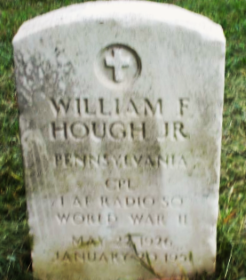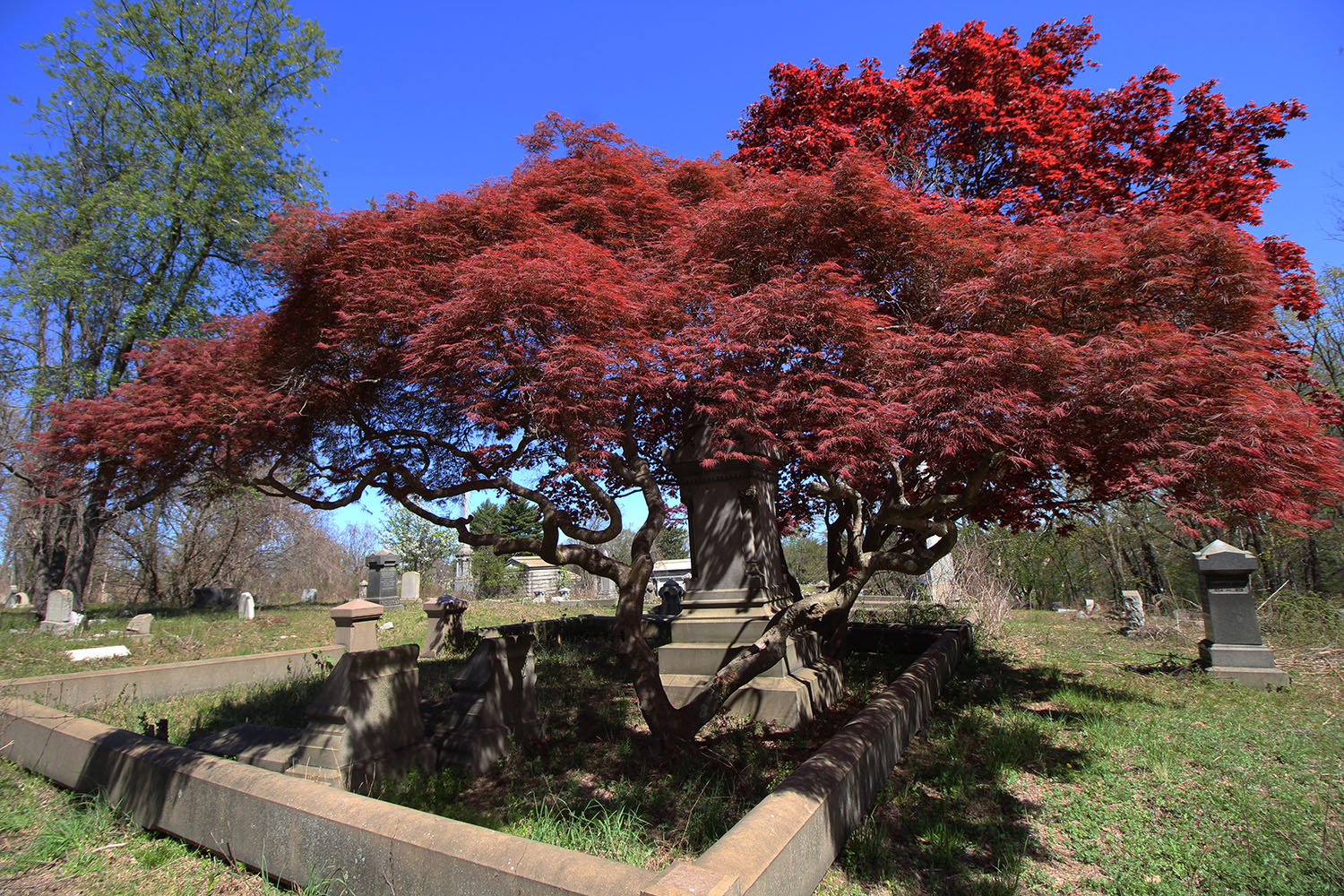Title: Army Technician 5th grade, World War II, Air Force Corporal, Korean War
Birthdate: May 22, 1926
Death Date: January 20, 1951
Plot Location: Section 140, Lot 13

William’s father was a World War I veteran who has his own Notable life story, found here. The junior William, or “Bill,” knew only one home address during his short lifetime, at 107 North Vodges Street, which is near 55th and Arch streets in West Philadelphia.
The Hough family (rhymes with “rough”) had German roots on both sides of Bill’s family. His parents were married the year before Bill was born and had a daughter, Ruth, two years later. His father’s mother, Catherine, also lived with them until she died in 1937. She was the first to be buried here at Mount Moriah. Bill’s uncle George came to live with them after that.
Unfortunately, his father had a long battle with high blood pressure and died suddenly on April 14, 1943. Bill had already dropped out of school and was working at Ace Towel Company. His father had served his country, and Bill was eager to do the same. Just one month later, on his 17th birthday, he registered for the draft and stated his date of birth so it would appear he just turned 18. The card was later marked with the correct date and he was rejected.
Bill did serve, but it wasn’t until June of 1944, and that was just after he married Anna Marie Duffy. She was 16 and the daughter of a woman who was a clerk at the same office where Bill’s father worked. They may have met a year earlier at his father’s funeral.
Bill must have had some specialized training in the Army or showed expertise in a certain area in order to move up from private to Tec 5. He may have operated equipment or performed maintenance on vehicles, weapons, or communication systems. He was overseas for most of 1945 and was discharged in 1946, the same year his daughter Linda was born.
Whatever marital bliss they enjoyed was short-lived, however. When the 1950 census was taken Bill was 23, divorced, paying alimony, and working in maintenance at a laundry (perhaps the towel company where he previously worked). He was living at home with his mother and uncle. His sister was also there with her husband and two children.
From those circumstances he decided to join the Air Force in August. He became a corporal with the 1st Radio Squadron (Mobile), which was part of the Air Force’s “Security Service.” It was a top-secret intelligence unit operating in Japan during the Korean War.
They monitored the Soviet Union’s military radio communications, particularly their Far East air forces. More than 90 percent of the North Korean MIG-15 jet fighters at that time were actually  piloted by Russians. Bill’s squadron monitored their radio traffic and provided intelligence to our F-86 pilots who intercepted them. They also assisted with dangerous missions using reconnaissance aircraft such as the RB-50 Superfortress. Those pilots would fly “penetration missions” towards Soviet air defenses to get them to turn on their radar and send aircraft up to intercept. It allowed the Radio Squadron to collect valuable data on enemy activity.
piloted by Russians. Bill’s squadron monitored their radio traffic and provided intelligence to our F-86 pilots who intercepted them. They also assisted with dangerous missions using reconnaissance aircraft such as the RB-50 Superfortress. Those pilots would fly “penetration missions” towards Soviet air defenses to get them to turn on their radar and send aircraft up to intercept. It allowed the Radio Squadron to collect valuable data on enemy activity.
According to Air Force records, there were two air accidents that occurred in Japan on January 20, 1951. Most likely Bill died in one at Tachikawa Air Base outside Tokyo involving the 374th Troop Carrier Group. A C-54 transport plane collided with another plane on the ground while taxiing, killing five people.
Bill’s military headstone stands beside his father’s in Section 140, just across from the Naval Plot. Unfortunately it should have mentioned “Korea” in addition to World War II. His grandmother is there as well, along with uncle George who was buried in 1960 and his mother in 1970.

Support the Friends of Mount Moriah
Help us in our mission to restore and maintain the beautiful Mount Moriah Cemetery by donating to our cause or volunteering at one of our clean-up events.

